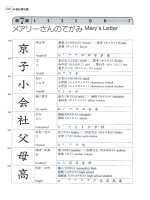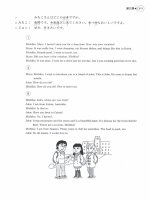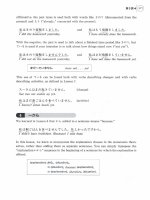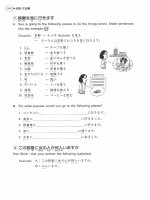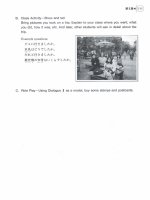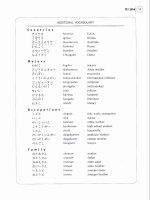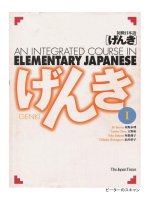genki 1 an integrated course in elementary japanese1 phần 8 potx
Bạn đang xem bản rút gọn của tài liệu. Xem và tải ngay bản đầy đủ của tài liệu tại đây (4.74 MB, 37 trang )
Michiko:
Mary,
I
haven't
seen
you
for
a
long
time. How
was
your
vacation?
Mary:
It
was
really fun.
I
went
shopping,
ate
Korean
dishes,
and
things
like
that
in
Korea.
Michiko:
Sounds
good.
I
want
to
travel,
too.
Mary:
Did
you have
a
fun
vacation,
Michiko?
Michiko:
It
was
okay.
I
went
for
a
drive
just for one
day,
but
I
was
working
part-time
every
day.
Maw:
Michiko,
I
want
to
introduce
you
to
a
friend
of
mine. This is
John.
He
came
to
Japan
Iast
month.
John:
How
do
you
do?
Michiko:
How
do
you
do?
Nice
to
meet
you.
Michiko:
John,
where
are
you
from?
John:
I
am
from
Cairns, Australia.
Michiko:
Is
that
so.
John:
Have
you
been
to
Cairns?
Michiko:
No,
I
haven't.
John:
It
has
mountains
and
the
ocean
and
is
a
beautiful
place.
It's
famous
for
the
Great
Barrier
Reef.
Where
are
you
from,
Michiko?
Michiko:
I
am
from
Nagano. Please come
to
visit
me
sometime.
The
food
is
good,
too.
John:
By
all
means,
I
would love
to.
Australia
gz?
snack;
sweets
%&El
Mew
Year's
%
c3-3-
boy
toy
ftQ1-T
girl
9b@
foreign
country
FFk*
singer
camp
this
person
(polite)
this
semester
president
of
a
company
class
future
drive
beer
art
museum
host
farniIy
lake
mountain
dream
roommate
to
tell
a
lie
to
become
hungry
to
own
(a
pet)
to
cut
dasses
to
take
(a
class);
to
get
(a
grade)
to
learn
toclimb
bket-)
to
work
*
Words
that
appear
in
the
dialogue
Irregular
~SLW
a
*
t
1
j
21~~1-p
&
Adverbs
&
z
*
L@9LX,
*
.fz"{
;iLQ
*
-?St+
TA
*
V3
tli:3
*
3253%
%7Y
Verbs
to
get
tired
to
quit
to
have
a
fight;
to
quarrel
to
introduce
herson
I:
perm
&
)
to
go
on
a
diet
to
be
late
(for
an
appointment)
to
study
abroad
(place
11)
and
Ofher
Expressions
$5
after
(an
event)
(eomt
a)
*%
-
coming
from
(place
Ql)
vew
and
then
just
.
.
.
;
only
.
.
.
.
.
.
points
it
has
been
a
long
time
okay;
so-so
more
You
can
use
a
verb
stem
(the
verb
form
that
goes before
3
+
;f:
b
\cl-9
to
describe
your
hope
or
aspiration.
+Eas*b2,
&&
-2
ftfib\T-jf,
or
&BIh2EJi
c\.'C"T,
Z/Y
C
L~pj3-3
jrr
b:
I*-
i%x
$:
.&
-
I
want
to
see
a
film
thzs
weekend.
L\-=>rS'+rn
tcB
3
k
L\TTo
be?:<
1
want
to
go
to
Chim
someday.
verb
stem
+
fiL\T$
1
want
to
do
.
As
you
can
see
in
the
first
example
above,
having
fi
L\
attached
to
a
verb
slightly
affects
the
composition
of
the
sentence.
A
verb
that
takes
the
particle
&
can
have
either
the
particle
2
or
5.'
when
it
is
followed
by
?:
t
l.
Particles
other
than
Q
remain
the
same.
The
combination
of
a
verb
and
f:
L\
conjugates
as
an
b\-adjective.
Here
are
examples
of
negative and past
tense
\
sentences.
&cr>Atc&a
t
i
4~~5
(
&
3
&*XI,
VK
A
I
don't
want
to
see
that
person
azy
more.
+-~-v~~~)t;~~~f~+~,
ye>+-
t~ci=$3
a
L~z,,
*-
L
I
I
went
to
a
department store,
because
1
wanfed
to
buy
a
sweater.
If
your
wish
is
one
you
have
entertained for some
time,
that
is,
if
you
"have
wanted
to,"
you
can
use
t=b\Z,g-=,T~\2-if
instead
of
fz'=\TT.
L;
b
2
L\T?
sentences
are
not
usually
used
to
describe
wishes
held
by
others.
Somebody
else's
wishes
are
usually
reported
in
Japanese
either
as
quotations,
observations,
or
guesses.
To
quote
somebody,
saying
that
she
wants
to
do
something,
you
can
use
Z
Z-;,
T
\
5
L
f=
L
*
with
1":
L\.
%7'J
-3htd
b4
Pitfiitz~lZZ9T~h3
L-tz,
I
I
L
I
Mary
said she
wamted
to
go
to
the
bathrom.
To
describe
your
observation
to
the
effect
that
somebody
wants
to
do
something,
you
must
use
a
special
verb
f=
6%
T
-i:~
\
B
instead
of
f;
I
\.
If
a
verb
takes
the
particle
&
,
the
derived verb
f:
P7
T
C:L
\&
will
retain
the
2,
unlike
\,
with
which
we
had.
a
choice
between
the
particles
75<
and
&
.
$7'1
3h/~33-t-~R&f-z15'7T~~aT,
rr)
(It
seem)
Mau
waxh
to
drink
coiXe@-
The
verb
I?=
V-7
-I
L
S
,
which
comes
from
the
dictionary
fonn
i3<
6,
indicates
"I
think
that
she
wants
to,
because
of
the
way
she
is
behaving."
We
will
have
more
to
say
about
this
type
of
sentence
in
Lesson
14.
You
already
know
that
you
can
connect
two
daum
with
the
te-form
of
predicates,
as
in:
%
kRTFkl%%
LX.
%ERsT2&~3To
gh?d.
ri.
60
+,4,:<71i
7
C
hz
Osaka,
1
will
do
sme
shopping
ad
eat
Korea%
food.
?
1
want
to
.
. .
/Do
you
w~nt
to
.
.
.
.
They
want
to
.
verb
stem
+
f=LlTT
verb
stem
+
TC~~TTL\~~
f=t\
conjugates
as
an
t\-adjective
fchl&
conjugates
as
an
u-verb
=
fix
or
Z
only
This
sentence,
however,
tends to
suggest
that
shopping
and
dining
are
the
only
activities
you
plan
to
perform
in
Osaka.
If
you
want
to
avoid
such
implications
and
want
to
mention
activities
or
events
just
as
exemplars,
thus
leaving
room
for
other
things
which
are
left
unsaid,
you
can
use
a
special
predicate
form
-2
3
-15
3
-if
4.
APZTRL\*~
tkq,
s~a~332+tq;t3
L~T,
SJ%?fJ.
*
tO
S./Y:
(923
1
fz
In
Osaka,
1
will
do
szcch
fhz~gs
us
shopping
ad
eating
Korealz
dkhes.
1
(activity
A)
ft
9
(activity
8)
k
do
such
things
as
A
and
B
I
To
get
the
f:
3
form
of
a
predicate,
you
just
add
9
to
the
past
tense sho?t
form
of
a
predicate.
(Thus
we
have
L
t=
9
for
the
verb
rf-
6,
whose
past
tense
is
t
',
and
&x.f=
9
for
$€%
6,
past
tense
h-tk
.)
Note
that
the
helping
verb
-5.
.3
at
the
end
of
the
Lktentence
t:
i':
indicates
the
tense
of
the
sentence.
You
can
change
a
f=
9
f:
'1
T4
sentence
into
the
past
tense,
or
incorporate
it in
a
bigger
sentence,
by
working
on
the
helping
verb
part.
sssa.
&~~t=tl,
~~~YSL~=~
t3
LE,
Lq3
2
9
<L>li
r
t
1:
'd
I
sfudied
ad
talked
wzth
my
fnmds,
among
other
things,
ooer
the
weekelad.
G-z~tz
9,
+%&M~hf7't
3
T6@h2'S3TT0
fir
C;LA:(
3.
-f
I
like
danckg,
Zisteni?rg
to
music,
and
so
forth.
The
past
tense
short
form
of
a
verb
+
t
Z
5'& &
describes
that
you
did
something,
or
something
happened,
in
earlier
times.
Have
you
mer
been
to
Europe?
-
E&L\,
?T~kLZ&~dk,33-j-~
I
r
Yes,
I
haue.
t
SA/E~+~Z~~~X/~Z
9
1aktt,
L'nSii
c7
Takgshd
has
never
been
abswt
from
classes
(in
his
life).
verb
(past,
short)
+
Z&&t&&
bane
the
experience
of
.
.
.
9
connects
two
nouns,
as
dues
Z
.
9
suggests
that
the
things
referred
to
are
proposed
as
'<
examples,
and
that
you
are
not
citing
an
exhaustive
list.
M
in
negative
sentences)
In
negative sentences,
you
often find
the
particle
t$
where
you
expect
752
or
%.
Observe the reply sentences
in
the
following dialogues:
Q
Ti
7
t'
GR
3
To
DO
yoit
watch
TK
Prof:
Yamashitla?
+
PL
fitl~%r.
+
A
:
LltlL,
7vk+t~H3-eAo
-A
No,
I
don't.
Q
:
~-t-fi~B&f?~~TT73~~
Do
you
want
to
have
a
cup
of
coffee?
03
A
:
blbl2,
x-t t$E&4.7~
-
<
&
9
&*Ao
No,
I
don't.
m
8
and
fir,
respectiveIy, would not
be
ungrammatical
in
the
above
examples.
Many
Japanese
speakers,
however,
find
the
tk
versions
more
natural.
The
rule
of
thumb
is
that
negative
Japanese
sentences tend to contain at
least
one
tA
phrase.
If
you
add
$Lik
to
the
sentences
above, therefore,
the
htt
need
for
is
already fulfilled,
and Japanese speakers
feel
much
less
3EZTi$SLk
<
&
9
3@Lo
I
don't
want
to
speak
in
English.
ir.
Z
lbta'
E
f
E
2
9
5
Lo
1
have
never
been
to
Hiroshima.
L'5L
f
c,
e(f
b
You
can
add
Etrf
to
numbers
to
talk
about
having
just
that many
items.
E
tf
implies
that
you
have
something
up
to
the
amount needed,
but
not more than that.
$Li2*9Atz-!ElI-2tf23fzZ
)5755:&'3
23,
b2L 3k
~r,abr,-
Si
I
have
met
that
person
just
once.
f2
tf
suggests
that
you
can
live with
that
few,
though
the number admittedly
could
have
been
higher.
We
wiII
learn another word in Lesson
14,
namely,
L75>,
which
means
"only" in the sense
that
you do.not
have
enough
of.
fLb
You
can
use
the
particle
tL
to
indicate
the
occasion
on
which
you
do
something.
@zst&kgY5
Ye$E42
IdX
2
I
ate
salad
at
dinner.
tz
can
also indicate the role
you
want something
to
play.
&&+t?+t~&3iZS%Et>&
tk,
I
bought
a
postcard
gs
a
sozlvsnir.
i.
IZ
lss
3
fi.
3)
F
.7
4
7
is
used
when
you
go
somewhere
by
car
for
pleasure.
To'
say
"to
have
a
drive"
or
"to
go
for
a
drive,"
use
F
7
4
YtZfi
5
r
<
or
F
9
4
7
3-&*
iaa-rww7'fimg
L~Z/I."Y,WLB
tfz0
aT%
*
I
went
fur
a
drive
to
the
kake.
When
you
simply
want
to
say
"to
drive
a
car"
(not
necessarily
for
pleasure),
use
B$Gf
5
instead.
3,' T/b
H$T@~S%L?Z
z
k&%9
&TAho
E
MA
3LTL
Have
you
ever
driuen
a
car
i~
Japan?
=
9
b
S,
like
the
English word
"dream,"
has
two
meanings.
One
is
the dream
w
you
have
while
sleeping;
the
others
the
dream
that
you
wish
would
come
true.
To
say
"I
have
a
dream,"
in Japanese,
you
use
the
verb
W8
for
&
sleeping
dreams,
and
l$F
9
T
L1&
or
h
.5
for
your
visions.
WJ~Z~~.GFB!Z~!
LLz.
I
had
a
scary
dream
Iest
night.
~W%77br?~?@rlr&
9
&To
I
have
a
dream-
An
bafzcn~~cnls~.i%~~~~~
~7tat
is
your
future
dream?
L.€i4b.
@Q
tc&
Efab
The
particle
hi
often
follows
the
particle
4:
in
sentences
describing
a
place
in
terms
of
the
things
that
are
found
there.
BBIZ~&A~~~~~~-~&V <
SL&9
&To
53
s29-ss
There
are
lots
of
big
departmsnt
stores
&
Tokyo.
%a,%~tsh~rf.t~t~B$=q,%*&~t~&
f
.,
i-YkL
etlN-
E anA?
+=A+&>
We
have
a
good
Japanese
feather
&
my
college.
These
sentences
would
be
okay
without
iA,
but
there
is
a
subtle
difference
between
the
versions
with and
without
I&.
The
idr
sentences
are
about
the
places;
they
answer questions (either explicitly
asked,
or
implicit)
like
"What
is
Tokyo
like?"
The
sentences
without
b&
after
E,
an
the
other
hand,
are
answers
to
a
question
like
"Where
do
you
find
good
teachers
of
Japanese?'?
See
the
grammar
note
discussing
the
difference
between
21s
and
ki
in
Lesson
8.
In
the
case
of
the
particle
E,
the
contrast
is between
the
simple
4Z
and
the
combination
iz
43.
(See
also
the
grammar
note
on
counting
people
I
in
Lesson
7.)
kjfi#
Practice
;fzh
L@5
Ic
A.
Change
the
following
phrases
into
f;l\
sentences.
Example:
>I
<-
~-
2
&<
6
(ia~k)
+
7h
~~i-~-~~~~~~
,TTo
(2)
~\>~<-fl-&:&<f=
{
$j
9
$+-Ao
B.
Pair
Work-Ask
if
your
partner
wants
to
do
the
things
above.
When
you
answer,
give
reasons
as
in
the
example.
C.
Change
the
following
phrases
into
kt+\
sentences
in
the
past
tense.
@
Example:
D.
Pair
Work-Ask
if
your
partner
wanted
to
do
the
things
above
during
their
child
hood.
E.
Pair
Work-Ask
your
partner
the
following
questions
and
report
the
answers
as
in
the
example.
Example:
A
:
i7h$X,dAN13z&xf=~\T?y5x,
tac
fz
B
:
k0tf-*$'&<fZ~\~-fO
f:
A
:
if~/3~/iak~:o&~e<f=~\zg~
-il~\a
L~C.
f:
I
h
ijX,;X/l2tz"~*&&^=i'%%$'7
TL\~-$-,
A
t:
I.
&z*i2hb:@$~*<f=~~T$$~~
u.
6
t*tI
t:
2.
fih2~\%
tdhE~~?=~\\~$~~
241
3.
Additional
VocabulawH
9
(Occupations)
M
si5
3
921%
(*%I
writer
YJ~-?-~]Z
b
l-f
L
\
S
9
&+XI
(%ST)
police
officer
L
@
-;a
(Z*>
td~\@?~
(#HZ)
actor/actress
L*kLg?
(*@I
75*
A
ZL.
(SS*)
nurse
L
1
9
tai
L
(i'iP$*)
<AZ"L
($FZ&)
lawyer
9
3
@
@
(3
baseball
player
5
9
1
(9&%%)
president
of
a
country
journalist
housewife
actress
firefighter
F.
Complete
the
following
sentences.
1.
+B
lar.~.x%f<h~
6.
?=
TT~
i
:/-
>
2.
'%
tfzt2*5t:$+J,
t.
L
\T-j-,
+
T
3.
&if/Lf-~
ha
6,
7h.
$39
2*ho
4.
l3+2LId~~Cb&T~&%,
->%I:
f:
Uh.
l>?
t
*
t=<&92*tLo
5
a,
t
7
2
t:
bb
7
7".
TT,
Z5-i
Z?
@ERbt='3.%Zbftr3
53
L;
@AJ
f-,<
I/ZT
A.
Tell
what
the
following people
did
on
the
weekend using
k
9-fz
995.
@
Example:
9
3
y:
saw
temples
in
Kyoto,
went
to
a
museum,
etc.
1.
?z
Gf
L:
went
camping,
went
for
a
drive,
etc.
2.
3
a
3
Z:
made sweets,
read
books
at
home,
etc.
3.
X-:
went
to
Osaka
to
have
fun,
went
to
eat,
etc.
4.
HA:
cleaned
his
room,
did
laundry,
etc.
5.
n
If-
b
:
met
friends,
watched
videos,
etc.
6.
LLT%!k:
went
to
a
hot
spring,
rested,
etc.
Pb
LI:PX+?lh
B.
Look
at
the
pictures
and
make
your
own
sentences
using
7"!J fr
r3F5.
C.
Pair
Work-Ask
your
partner
the
following
questions. When
you
answer,
use
tz!ZI tzg$6
as
in
the
example.
Example:
A
:
EI*T'fT%
Lt~~1T-j-h~~
ir~ih,
2::
B
:
a
+Ql%SF
~f%~t'.
1.
f
(Mt.
Fuji)
fi
1
L
fz~htt,
1:
13/,,
1.
L
::
.,.
r
5
mia
A.
The
following
are
what
John
has
or
hasn't
done.
Make
the
sentences
using
-z
tjyh.ajs.
pJ
Example:
0
eat
tempura
+
X;:
b
i?
'fk<f:
.L
Z
&'a&,
3
3
$,
<
X.
7:
x
goto~~kyo
+
~gt:fi~f=~t~~;fi~a-w~,
V+%.
-
i
I,
2.
C
study
French
4.
x
go
to
Hiroshima
6.
C
sleep
in
class
1.
0
eat
sushi
3.
0
work
at
a
restaurant
5-
x
write
love
letters
7.
0
climb
Mt.
Fuji
9.
x
see
Japanese
movies
8.
x
drive
a
car
in
Japan
6.
Pair
Work-Make
questions using
Z&hxS5
and
ask
your partner.
Example:
H$-Ql%$B??&c
1:
i3A
3
*+
@
A:
a+a%ra2Rhfzrrh~Ek,9aTh~,
::
!:A
5
0
B
:
Cab,
$5
9
#To
Pair
Work-Ask
your
partner
the
following
questions.
When
you
answer,
use
-+-
as
in
the
example.
Example:
A
:
rX/Qs'B*Hm??k
{'fZ~~~dxo
1-
IiX.9~i
'J
f:
B
:
-j-L~x~i:b??l
u%<3T0
i
h-
f:
1-
z*&~x$-Y
-2
1
{
B&
Tk
A
2-
r+,4,5333$*2*33
T-$-$ao
-F
3.
Z+tL''d*~~FC
L
<
fi
9
a
Th*o
'Iri
7
-3
<
I"GcG3.
z*XIQ*-;l*;J2&
9
3
a-po
4.
&Qf:aAFa&n
f:
Li<Ti
f
C
0
5.
&ta'tz@A~t~GA,
YZOEEl~hfi
CL
\3
-j-&.o
f:rxBr(
<
I-
Zrli
6.
YbQ
&cfi-=l?=
2
Z
$'$I
3
3
Ti$>,
?f
2
TT-h',
i
{
i\
7.
+,
r"mgsgR9ci:~\a
~r5.,
L\t
r*
r:
8.
1$F13$
(actors)
@+T,
?<kl.~'%3
TTh'o
Ii~r@i
kh.
-f
9.
*+
G3
+
T,
f2-;kl.6f*
3
T-fda0
d-
Ln
3
A.
Talk
about
your
dream
for
the
future
or
what
it
was
when
you
were
a
child.
1.
&at~mpklmT~d~~
rph
Example:
$Lid#&,
%&%GtzQ
9
?LL~T.~-~
T
LT,
L~&L,&QEI:~~
hf;L
Ciiir'
IS.&
f
(!:
i.
f;.b
Tj-,
B.
Class
Activity-Find
someone
who
.
.
.
I.
has
seen
celebrities
2.
has
never
used
chopsticks
3.
wants
to
live
in
Japan
in
the
fut~lre
4.
wanted
to
be
a
star
(2
9'
-)
as
a
child
5.
wants
to
cut
classes
tarnorrow
6.
doesn't
want
to
go
out
today
C.
Class
Activity-Bring
pictures
of
your
hometown
and
describe
it.
Example:
3
3&4$3@9
f:
{
3
Ql@j*%
(theater)
$'&
9
3
$o
Zit&
rpihr,
LT'Lm3d./,
[f
1
{
~ZL-~;~JIL$X~"Z~,
2HT%k%Lk!J
I-2
Lf:.
k
:ii&
!T
E+kA
bzJ@~
7,
&fii.%
1:4+~if=~~TT,
a~ri
d ?
r
L
A
Ilnthe
Ja~anese
Class
I
I
Useful
Expressions
YG
6
T%
Both
are
fine.
ElCTT,
Same
thing.
6
V
f:~~f=~qqjy-~~
More
or
less
the
&
k
&l
7
Ygk'2To
A
little
different.
3
h;
$22
4
*A,
Can't
use
it.
1111.
~41S~
T
L~
3
To
It's
wrong.
same
-
3
G&
3-%
2513"T
<
ft"%\,
Raise
your
hand.
7
(
7":3
bho
Read
it
before
coming
to
class.
I
LT
{
?53bi0
Hand
in
the
homework.
L*<f;'L>
E
&e+e2HCT
<
f5Sh0
Close
the
textbook.
315
6.
L
+
Z
ZQ~OA~ZWL~T<~;'~L~,
Ask
the
person
sitting
next
to
you.
VY
4
9tbf
<
?<??L\,
The
time
is
up.
Please
stop.
+El
ldZ-h-?.#%b
Y)
ATo
That's
it
for
today.
51
=I
f;
Useful
Vocabulary
%%
homework
L
,
t
fz-1.
L&3
1
deadline
~
RF
kXb1
exercise
&%
meaning
1
k
pronunciation
question
8
answer
33
#!I
example
hr\
I
75.7
s
(
3
&
0
(correct)
<
T~I~?=EL~Z-
colloquial
expression
n.f:
$at;
bookish
expression
rb
&tz
T
L
\
;2a
L
s
Q
$
L
3
-polite expression
sg
dialect
[Xi
If&
Gq3
standard
Japanese
iYr7UtpL
Z
k
Z
2
i2
.
for
example
t36.E~
anything
else
-%
number
.
.
.
licv
-<-
"
-V
page
number
. . .
-%T
line
number
.
. .
ki
*I
two
people
each
L.f:
'I
Feeling
Ill
3%
xl,
@
Mary
and
Michiko
are
@
At
a
hospital.
Michiko:
You
don't
look
well,
Mary.
Mary:
Urn
.
.
.
I
have
a
little
stomachache.
Michiko:
What's
the
matter?
Mary:
I
went
out
to
have
dinner
with
my
friend
yesterday.
I
think
maybe
I
ate
too
much.
Michiko:
Are
you
all
right?
Mary:
Yes.
Don't
worry
about
it.
Oh,
it
hurts.
Michiko:
You
had
better
go
to
a
hospital.
Mary:
Doctor,
I
have
a
sore
throat.
I
had
a
stomachache
yesterday.
Doctor:
I
see.
You
have
a
fever,
too.
It
is
just
a
cold.
Mary:
WelI,
I
wiII
have
a
tennis
tournament
soon,
so
I
have
to
practice,
though
.
,
.
Doctor:
You
had
better
not
exercise
for
a
couple
of
days.
Mary:
I
understand.
Doctor:
Take
medicine
and
go
to
bed
early
tonight.
Mary:
Yes.
Thank
you
so
much.
Doctor:
Take
care.
Nouns
&L
L
\A
*
SQa'h.
*
2Jaolc~
h'kL
3
i5&
leg;
foot
meaning
stomach
cold
girlfliend
boyfriend
temperature
(weather-not
used
for
things)
cloudy
weather
match;
game
juice
politics
grade
(on
a
test,
etc.)
cough
throat
tooth
flower
sunny
weather
clothes
hangover
present
homesickness
thing
(concrete
object)
snow
business
to
take
care
of
L\-adjectives
ii53~h
VL\
sweet
*
L\$=L\
%L\
hurt;
painful
G~L\
9
Ll
there
are
many
.
. .
%?3
Ll
d%~l
narrow;
not
spacious
-3
Z*?
W$3
&
L\
,
b
inconvenient;
to
have
a
scheduling
conflict
hbl\
,%L\
bad
*
Words
that
appear
in
the
dialogue
Irregular
Verbs
3X/Gkj$&
6
*
LhEA9~\T6
~cBCT
4
Adverbs
and
Ofher
~19
#j
*
;~;&=L\L"~Z
+
l7&3$'3~\
*
fz=,i=tL
T3
4
??if
*
-TLa
i
r"
*
6-3ttCcG
*
-QlT
fantastic
to
catch
a
cold
to
be
interested
(in
.
,
.
)
(tupk
I=)
to
lose
to
have
a
fever
to
become
thirsty
to
cough
to
break
up;
to separate
(person
Z
)
to
get
nervous
to
worry
Expressians
always
Get
well
soon.
don't
look well
probably;
maybe
as
much
as
possible
probably;
.
.
.
,
right?
.
.
.
degrees
(temperature)
for two
to
three
days
because
.
.
.
+ah7
for
the
first
time
very
soon;
in
a
few
moments/days
2%
is%
Grammar
lZ5
There
are
two
distinct
ways
to
mahe
a
shternent
in
Japanese*
One
way
is
to
simply
report
the
facts
as
they
are
absmed.
This
is
the
made
of
speh
that
we
have
learned
so
far.
In
-this
lessan,
we
will
learn
a
new
way:
the
mode
of
apla:ab-ak
things.
A
repor5
IS
m
isolated
description
of
a
fact,
When
you
are
late
fur
an
appointment3
you
can
already
report
in
Japanese
what
has
haapened,
sqX
#%
2
+FAT
L
fi
.
TEs
sentence,
however,
does
not
have
the
right
apologetic
tone,
because
i;
is
not
offered
as
an
explana-
tion
'for
anything.
lf
you
want
to
mentian
the
bum
fail'=
to
m
on time
as
an
excuse
for
being
late.,
YOU
will
need
to
lrse
the
explamfi~a
mock
af
speech,
and
say:
(As
it
hiz~~e,jl
fhla
Bw
d&'t
come~
An
explanation
has
two
components,
one
that
is
explicitly
described
in
the
sentence
(the
bus
not
corning),
and
another,
which
is
implied,
or
explained,
by
it
(you
being
late
for
the
appointment).
The
sentence-final
expression
&-il-9
serves
as the
link
between
what
the
sentence
says
and what
it
accounts
for.
Compare:
&
L
?:
7
2
b
$:
;ti
!I
3
To
1
haue
an
exam
tomorrow.
(a
simple
observation)
&
L
?zTX
b
-h%
21
AT-$,
1
haoe
an
exam
tomorrow.
(So
I
can't
go
ouf
toflight.)
I
want
to
go
to
the
bathroom.
(decIaration
of
one's
wish)
I
want
to
go
to
the
6afhroona.
(So
tell
me
where
it
is.)
hTT
goes
after
the
short
form
of
a
predicate.
The
predicate
can
be
either
in
the
affirmative
or
in
the
negative,
either
in
the
present
tense
or
in
the
past
tense.
tLTT
itself
1
is
invariant
and
does
not
usually
appear
in
the
negative
or
the
past
tense
forms.
In
writing,
it
is
more
common
to
find
PI
TT
instead
of
LT-3
@@;Jr
1
<
3
b
Pt
T?,
(in
response
to
the
question,
"Why
do
you
look
so
upset?")
Qi>Q3
(As
a
matter
of
fact)
My
grade
zk
not
good.
'In
casual
exchanges,
k
tT
appears
in
its
short
form,
tLR.
In
casual
questions,
hTC;-f;ba
is
repIaced
by
a.
We
will
examine
these
further
in
Lesson
15.
b
7
fz
A
T
(explaining
to
a
person
who
has
caught
you
smiling)
L
If6
6
The
exam
is
over.
(That's
why
I'm
smiling.)
When
it
follows
a
noun
or
a
2-adjective,
2
comes
in
between.
report
sentences
explanation
sentences
&-adjective:
wPT'$
Sk'ZJhTT
Lb
noun:
89~~
fP<i?Ll
?%ahTT
#<wLl-
You
can
use
k
T-P
in questions
to
invite
explanations
and
further
clarifications
from
the
person
you
are
talking
to.
It
is
very
often
used
together
with
question
words,
such
as
r
i
L
-I
(why)
and
r
9
L
TZ
(what
has
happened).
Q
:
Y-f'-J
L
f@t:$q;htz
hTT&,
s.n
ha!,.
Why
did
you
break
up
with
your
boyfriend?
(You've
got
to fell
me.)
A
:
*,
*&*A~aS:
l.=Xr;
tL~~hT"Po
h.n
.
tat
\
Oh,
him.
He
never
takes
u
bath.
(That's
a
good
enough
reason,
isn't
it?)
Q
:
Z*j
tJikTTha,
What
happened?
(Yozc
look
shattered.)
A
:
T~~E,LPACT.~
L
%y
cat
died.
(That
should
explain
how
I
look
today.)
You
can also
use
X/Tf
to
provide
an
additional
comment
on
what
has
just
been
said.
A
:
z
7
$)
~'1kqkf+gT-$-t2~
515
L
3
That3
a
great
textbook
that
you
are
using.
B
:
22,
f~~~~~~&75~~~~7'~XI-I"TO
$,j!:L
i
.ttA,trr
h.
You
bet.
The
professors
ak
my
university
wrote
if
(for
your
iafomation).
'A
f?~
L
kX.'II*Trls
question
is
best
answered
by
a
kCT
sentence
with
the
subject
marked
with
the
particle
i3.'
rather
than
13,
as
in
this
example.
See
Lesson
8
for
a
related
discusion.
Verb
stems
may
be
fdowed
by
the
helping
verb
T
P
8,
which
means
"too
much,"
or
"'to
excess.''
F
6
conjugates
as
a
regular
ru-verb.
You
musb
mt
eat
too
much,
-ifF
4
can
dso
iolluw
L\-
and
3-adjective
bases
(the
parts
which
do
not
change
in
conjugations);
you
drop
the
L
and
3
at
the
end
of
the
adjectives
and
then
add
T
,4'
6.
This
book
is
too
expensive.
That
person
is
too
flice.
t
3
9
75%
\b
xT?
"it
is
better
(for
you)
to
do
.
. ."
is
a
sentence-final
expression
that
you
can
use
to
give
advice.
When
you
suggest
an
activity
with
I2
i
Qxb
h~
htj,
you
are
giving
a
very
specific
piece
of
advice;
namely,
that
it
is
advisable
to
do
it,
and
if
one
does
not
follow
the
advice,
there
is
a
danger
or
a
problem.
13
j
fiZk
\L
\T:"-if
is
peculiar
in
that
it follows different
tense
forms,
depending
on
whether
the
advice
given
is
in
the
affirmative
or
the
negative.
When
the
advice
is
in
he
affirma-
tive,
43
9
.hzr
klTTff
generally
follows
the
past
tense
short
form
of
a
verb.
When
the
advice
is
in the
negative,
however,
the
verb
is
in
the
present
tense
short
fom.
You'd
better
eat
more
vegetables.
If
is
better
mf
fu
skip
classes.
You
can
use
@T
to
give
the
reason
for
the
situation
described
in
the
balance
of
the
sentence.
Semantically,
e>
T
is
just
like
fix
6.
Stylistically,
T
sounds
slightly
more
formal
than
dL
h
.
(reason)
DT
(~ituation)~
(situation),
because
(reason).
~17%
ElrQ;%T%T@T,
H+Shi'l+t=Q
9
3
LL:,
It
IfX.
r
ItG.
-
t-
1I&
I
Uii
T
My
Japanese
has
zmpruved
because
1
always
speak
Japazese.
did
not
sleep
last
night,
because
I
had
a
lit
of
homework.
The
reason
part
of
a
sentence ends
in
a
short
form
predicate.
When
DT
folIows
a
2-adjective or
a
noun,
Q
comes
in
between,
as
it
did
with
the explanatory predicate
AT$
A
a,
3
c;~W-9-~
u.
l:
I
do
not
like
that
persola,
because
he
;is
mean.
+ataaqsawr,
mca+w-r-?,
3
i:%kiU=-
7
rl
Banks
are closed
beca&e
foday
is
a
Sunday.
3
We
use
2
{
'G
+
~\1?
2
*pL
to
say
that
it
is
necessary
to
do
something,
or
"must."
*a72
FfiQEk,4fiab,
?<
{
3X/%%LQ
a\
%+-L\I~~*X/,
&brLlpl
-LL?L?
I
have
to
stzkdy
u
lot,
because
there
wtlZ
be
an
exam
next
week.
2
{
ti
+
means
"if
you
do
not
do
.
.
."
and
1
\
I
*
X,
roughly
means
"you
cannot
go";
2
{
%
9
i.~\lf
-kt&
therefore
means
"you
cannot
go
not
doing
.
.
."
with
the
double
negatives
giving
rise
to
the
affirmative
sense
of
the
mandate.
To
form
a
2
<
5;
e
1.
\
I
j
2
-@
/V
sentence,
we
substitute
fd:
L\
in
the
negative
short
form
of
a verb
with
3
<
6
+
verb short
negative
"must"
ma
1=
B<&l
t
B6t6<5+L\IfSl2hr
k
I-
e7
zaaL\
E%3fg<5~L~lf%lr3/v
GI
-
Ll
$5
I/=
La<
SF
L\lf%I&hr
<a
C-
'tdL\
Zt6<5*L~n%ehr
L
\t$2
-&A,
is
grammatically
the negative
long
form
of
a
verb
in
the
present
tense.
You
can
change
3
{
G
+
6\13
3
to
2
{
%s
3
*AT
L
7L=
(past tense)
to
say
you
had
to,
and
to
2
{
t;+
k\C?Qb\
(the
short
form,
present
tense)
in
casual
speech
and
before
elements
like
tL
T
T.
'In
writing
and
in
very
format
speech,
td
<ak\lf
3
++A,
is
more
common
than
Q
(-\r\df
3
+?A.
133
ti,
fiett%3
3
{
-1;+~\t-f3.tS-kTLf=~
(long
form,
past)
4<
U
2%
1
had
to
get
up
at
six
thG
morning
GH.
LQ
{
&PL~~-~QL\,&T?,
(short
form,
present)
3:
kh-Llpi
(The truth
is,)
I
mzcst
practice
every
day.
We
use
the
sentence-final
expression
T
L
1
3
(probably)
when
we
are
making
a
guess
om.
a
prediction,
-r"
t
1
=I
follows
verbs
and
L\-adjectives
in
short
forms,
in
the
affirmative
4
and
in
the
negative.
(verb)
If
will
probably
rain
tomorrow.
It
will
probably
~ot
rain
tomorrow.
It
is
probably
cold
~TZ
Hokkaido.
If
is
probably
not
cold
k
Hokkaido.
T
L
.I
?
may
aIso
follow
Q-adjective
bases
and
nouns.
Note
that
T
L
1
5
goes
directly
after
theseelements;
we
do
not
use
X QTLa
-
i,
x G~)TLI
-
5,
or
X TX+Li
-
5.
tr
'
(
fa'
-adjective)
Professor
Yamha'da
probably
likes
%h
Professor
Yamkita
probably
doem't
like
%kk
(noun)
&aAtA;S-X
I-
7
'I
TATL
$
$o
U
I:
U
/,
That
pmm
&
probably
an
Australian.
$-2
b?j"IThC:'Qk\\r"Ldt
3.
Thatpmmis~oba6bmtanA'1~~~akia~
U
L
I
i
rnay
also
follow
predicates
in
the
past
tense.
We
will,
however,
concentrate
on
the
present
tense
exampIes
in
this
lesson.
T
L
d;
9
sentences
can
be
turned
into
questions
( T*
L
J
5
5.1,
which
can
be
used
to
invite another
person's
opinion
or
guess.
~hkh
wu~ld'
you
say
is
more
difficulty
~apanese
or
Korean?
The
short
form
of
T
L
a
j
is
f."S
3
.
You
can
use
it
to
cautiously
phrase
a
prediction
or
an
analysis.
t=cjLShtAR%7S%4f:5
3
Z,BC\~-~,
311
k
i4k
I
think
Takeshz
would
be
interm
fed
in
if.
In
casual
exchanges,
you
can
use
T
L
L
5
(with
the
question
intonation,
and
most often
pronounced
as
somewhat
shorter
T
L
a
)
when
you
want
to
check
if
your
partner
agrees
that
you
have
the
correct
understanding
about
what
you
have
just
said.
5h>,
+ElSrSrb75*bTLa
?
Zh,
<,
t
l
I
Johzy
you
uwderstand
Chinese,
rzght?
Caa
you
read
this
for
me?
